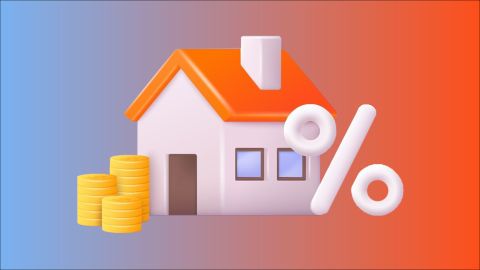होम लोन योग्यता की शर्तें सामान्य प्रश्न
हां, 5 वर्षों के लिए होम लोन लेना संभव है. लेकिन, लोनदाता और आपकी योग्यता के आधार पर लोन की उपलब्धता और शर्तें अलग-अलग हो सकती हैं. आप हमारे होम लोन योग्यता कैलकुलेटर का उपयोग करके अपनी होम लोन योग्यता चेक कर सकते हैं.
आमतौर पर, होम लोन की पुनर्भुगतान अवधि 32 साल तक की होती है. लेकिन, आप अपनी योग्यता और लोनदाता के विशिष्ट नियम और शर्तों के आधार पर 3 वर्ष जैसी छोटी लोन अवधि का विकल्प चुन सकते हैं. ध्यान रखें कि छोटी लोन अवधि के कारण आमतौर पर अधिक मासिक किश्तें आती हैं, इसलिए कम अवधि का विकल्प चुनने से पहले अपनी फाइनेंशियल प्लानिंग का आकलन करना आवश्यक है.
आप अच्छा क्रेडिट स्कोर बनाए रखकर, मौजूदा कर्ज़ को कम करके और स्थिर आय वाले सह-आवेदक को शामिल करके अपनी होम लोन योग्यता में सुधार कर सकते हैं. लंबी अवधि का विकल्प चुनना और स्थिर रोज़गार इतिहास सुनिश्चित करना, उच्च लोन राशि के लिए योग्यता प्राप्त करने की संभावनाओं को भी बढ़ा सकता है.
होम लोन योग्यता की शर्तें आपकी योग्यता की लोन राशि, ब्याज दर और पुनर्भुगतान शर्तों को प्रभावित करती हैं. इन शर्तों को पूरा करना, जिसमें आय, क्रेडिट स्कोर, आयु और रोज़गार की स्थिति शामिल हैं, यह सुनिश्चित करता है कि आप अनुकूल शर्तों और अप्रूवल की उच्च संभावनाओं के साथ बेहतर लोन विकल्प प्राप्त करें.
अगर आपकी मासिक सैलरी ₹75,000 है, तो आप आमतौर पर मौजूदा कर्ज़ और क्रेडिट स्कोर जैसे कारकों के आधार पर ₹50 लाख से ₹60 लाख तक का होम लोन प्राप्त कर सकते हैं. लोनदाता आमतौर पर योग्यता की शर्तों के आधार पर आपकी मासिक आय का 60 गुना तक लोन प्रदान करते हैं.
सैलरी के आधार पर होम लोन की योग्यता चेक करने के लिए, ऑनलाइन होम लोन योग्यता कैलकुलेटर का उपयोग करें. अपनी योग्यता की लोन राशि का अनुमान लगाने के लिए अपनी मासिक सैलरी, मौजूदा EMI और लोन अवधि जैसे विवरण दर्ज करें. यह आपके फाइनेंस को उसके अनुसार प्लान करने में मदद करता है.
आय के आधार पर योग्यता चेक करने के लिए, अपनी सकल मासिक आय और अन्य फाइनेंशियल विवरण दर्ज करके होम लोन योग्यता कैलकुलेटर का उपयोग करें. यह आपको लोनदाता के इनकम-टू-लोन रेशियो को ध्यान में रखते हुए अधिकतम लोन राशि के बारे में जानकारी देगा.
प्रमुख कारकों में आय, क्रेडिट स्कोर, रोज़गार का प्रकार, आयु और मौजूदा देयताएं शामिल हैं. उच्च आय और क्रेडिट स्कोर योग्यता को बढ़ाता है, जबकि उच्च कर्ज़ या अस्थिर रोज़गार जैसे कारक इसे कम कर सकते हैं.
बजाज फिनसर्व होम लोन के लिए योग्यता प्राप्त करने के लिए, आपको स्थिर आय वाला भारतीय निवासी होना चाहिए, या तो नौकरी पेशा या स्व-व्यवसायी होना चाहिए. न्यूनतम प्रवेश आयु आमतौर पर 23 वर्ष होती है, जिसमें लोन मेच्योरिटी पर अधिकतम आयु नौकरी पेशा व्यक्तियों के लिए 65 वर्ष और स्व-व्यवसायी व्यक्तियों के लिए 70 वर्ष तक होती है. 725 या उससे अधिक का क्रेडिट स्कोर पसंद किया जाता है, और योग्यता आपकी आय के स्तर और पुनर्भुगतान क्षमता पर भी निर्भर करती है. अपना मोबाइल फोन नंबर और OTP दर्ज करके बजाज फिनसर्व से होम लोन के लिए अपनी योग्यता चेक करें.
अगर आपकी मासिक सैलरी ₹50,000 है, तो आप अपनी आयु, फाइनेंशियल दायित्व और क्रेडिट स्कोर जैसे कारकों के आधार पर ₹25 लाख से ₹30 लाख के बीच के बजाज फिनसर्व होम लोन के लिए योग्य हो सकते हैं. बजाज फिनसर्व आमतौर पर आवेदक को अपनी निवल मासिक आय का लगभग 60 गुना तक उधार लेने की अनुमति देता है, बशर्ते उनकी पुनर्भुगतान क्षमता और पूरी फाइनेंशियल प्रोफाइल आवश्यक योग्यता मानकों को पूरा करती हो.
₹20 लाख के बजाज फिनसर्व होम लोन का लाभ उठाने के लिए, आपको आमतौर पर कम से कम ₹25,000 से ₹30,000 की निवल मासिक सैलरी की आवश्यकता होती है. सटीक आंकड़ा आपकी आयु, क्रेडिट स्कोर, कार्य अनुभव और मौजूदा फाइनेंशियल प्रतिबद्धताओं पर निर्भर करता है. कम देयताओं वाली उच्च आय आपके अप्रूवल की संभावनाओं को बढ़ाती है. बजाज फिनसर्व के होम लोन योग्यता कैलकुलेटर का उपयोग करना यह जानने का आसान तरीका है कि आपकी आय आवश्यक बेंचमार्क से मेल खाती है या नहीं.
बजाज फिनसर्व 23 से 65 वर्ष (नौकरी पेशा) या 23 से 70 वर्ष (स्व-व्यवसायी) की आयु के भारतीय नागरिकों को होम लोन प्रदान करता है. नौकरी पेशा आवेदक को कम से कम 3 वर्षों के कार्य अनुभव के साथ प्रति माह कम ₹25,000 अर्जित करना होगा. स्व-व्यवसायी व्यक्तियों के पास कम से कम 5 वर्षों का बिज़नेस पुराना होना चाहिए. 725 या उससे अधिक का क्रेडिट स्कोर पसंद किया जाता है. योग्यता के आधार पर लोन की अवधि 32 वर्ष तक बढ़ाई जा सकती है.
बजाज फिनसर्व से ₹1 करोड़ के होम लोन के लिए, EMI आपके द्वारा चुनी गई ब्याज दर और लोन अवधि पर निर्भर करती है. उदाहरण के लिए, 25 वर्षों से लगभग 8.75% की ब्याज दर के साथ, EMI ₹82,200 के करीब हो सकती है. अगर उसी अवधि के लिए ब्याज दर 9% है, तो EMI थोड़ा बढ़कर लगभग ₹84,000 हो सकती है. सटीक परिणामों के लिए बजाज फिनसर्व के EMI कैलकुलेटर का उपयोग करें.
आप अपनी वेबसाइट पर दिए गए फ्री ऑनलाइन कैलकुलेटर का उपयोग करके अपनी बजाज फिनसर्व होम लोन योग्यता और EMI की आसानी से गणना कर सकते हैं. बस लोन राशि, ब्याज दर और पसंदीदा अवधि दर्ज करें. कैलकुलेटर तुरंत मासिक EMI दिखाएगा, जिससे आपको अपने फाइनेंस को बेहतर तरीके से प्लान करने में मदद मिलेगी. यह टूल बहुत सटीक है, यूज़र-फ्रेंडली है और मैनुअल गणना या जटिल गणितीय फॉर्मूला की आवश्यकता को समाप्त करता है.
हां, आप एक से अधिक बजाज फिनसर्व होम लोन के लिए अप्लाई कर सकते हैं, बशर्ते आप प्रत्येक लोन के लिए योग्यता की शर्तों को पूरा करते हों. जब तक आपकी आय और पुनर्भुगतान क्षमता है, तब तक कोई व्यक्ति अपने होम लोन की संख्या पर कोई प्रतिबंध नहीं लगा सकता है. लेकिन, हर अतिरिक्त लोन के साथ, लोन-टू-वैल्यू (LTV) रेशियो कम हो सकता है. अप्रूवल के लिए अच्छा पुनर्भुगतान रिकॉर्ड और मजबूत क्रेडिट इतिहास आवश्यक है. अपना मोबाइल फोन नंबर दर्ज करके और OTP के साथ इसकी जांच करके अपने होम लोन ऑफर चेक करें.
खराब क्रेडिट इतिहास के साथ बजाज फिनसर्व होम लोन प्राप्त करना मुश्किल है, क्योंकि यह उच्च पुनर्भुगतान जोखिम को दर्शाता है. लेकिन, आप अभी भी मौजूदा कर्ज़ का भुगतान करके, अपनी क्रेडिट रिपोर्ट में गलतियों को ठीक करके या मजबूत क्रेडिट प्रोफाइल वाले सह-आवेदक के साथ संयुक्त रूप से अप्लाई करके अपनी संभावनाओं में सुधार कर सकते हैं. नियमित रूप से समय पर बकाया राशि का भुगतान करने और धीरे-धीरे अपने क्रेडिट स्कोर को बेहतर बनाने से आपको होम लोन के लिए योग्य होने में मदद मिल सकती है.
नहीं, बजाज फिनसर्व अनरजिस्टर्ड प्रॉपर्टी के लिए होम लोन प्रदान नहीं करता है, क्योंकि रजिस्ट्रेशन अनिवार्य है. रजिस्ट्रेशन स्वामित्व के कानूनी प्रमाण के रूप में कार्य करता है और लोन एप्लीकेशन को प्रोसेस करने के लिए आवश्यक है. लेकिन, अगर प्रॉपर्टी अभी भी निर्माण में है, तो आप अप्रूव्ड प्रोजेक्ट डॉक्यूमेंट के आधार पर लोन प्राप्त कर सकते हैं. रजिस्ट्रेशन पूरा होने के बाद, इसे लोन के अंतिम वितरण के लिए सबमिट करना होगा.






